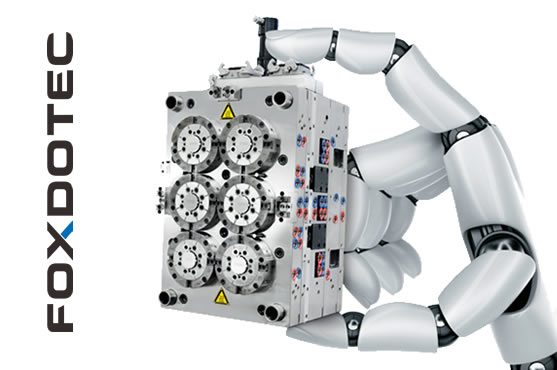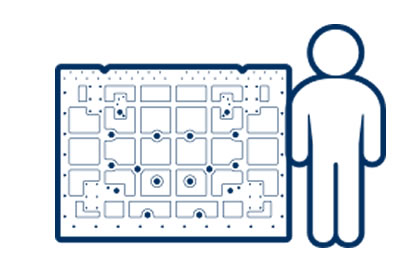Die Casting Mold Engineering
Forging Excellence, Casting Innovation. Elevate your production standards with our Die Casting Molds, delivering superior strength and impeccable finishes.
Die Casting Mold
What is Die Casting Mold?
A Die Casting Mold is a specialized tool used in the die casting process to shape molten metal into complex forms with precision. Crafted from durable materials like steel or aluminum, it endures high temperatures and pressure. Its intricate design ensures consistent production of high-quality metal parts for diverse industries.
Precision Injection Mold


What is Die Casting Mold Process?
Die Casting Mold Process
- Tooling Design: Engineers create a detailed design of the mold based on product specifications, considering factors like part geometry and material flow.
- Tool Construction: Skilled toolmakers fabricate the mold using materials such as steel or aluminum. This involves CNC machining, EDM, and other precision techniques to achieve the desired mold shape.
- Injection: Molten metal, typically aluminum or zinc, is injected into the mold cavity under high pressure using a specialized die casting machine.
- Cooling: The molten metal solidifies as it comes into contact with the cooler mold surface. Proper cooling is crucial to ensure uniform part quality.
- Ejection: Once the part has solidified, the mold opens, and the finished part is ejected using pins or ejector mechanisms.
- Trimming and Finishing: Any excess material or flash is removed from the part, and additional finishing processes like machining or surface treatment may be applied.
This process offers high production efficiency and allows for complex part geometries with tight tolerances.

CNC Machining
CNC machining is a computer-controlled manufacturing process that utilizes pre-programmed software to dictate the movement of machinery and tools. This technology enables the precise cutting, drilling, and shaping of materials such as metal, plastic, and wood to create intricate components with high accuracy and consistency.
Read More
Precision Grinding
Precision grinding is a manufacturing process that involves the removal of material using abrasives to achieve extremely tight tolerances and surface finishes. used to produce components with intricate shapes, precise dimensions, and smooth surfaces. Precision grinding techniques include cylindrical grinding, surface grinding, and internal grinding.
Read More
Electrical Discharge Machining
Electrical Discharge Machining (EDM) is a non-traditional machining process that utilizes electrical discharges to erode material from a workpiece. It is particularly useful for machining complex shapes and hardened materials that are difficult to machine with conventional methods. EDM can achieve high precision and surface quality.
Read MorePrecision machining and manufacturing involve the use of advanced techniques and equipment to produce highly accurate and intricate components with tight tolerances. It requires expertise in machining processes, material properties, and quality control methods to ensure the production of high-quality parts for various industries.
Key Aspects of Understanding Injection Molds
- Design Principles: Understand the principles of injection mold design, including considerations for part geometry, material flow, cooling, and ejection.
- Materials and Construction: Explore the materials commonly used in injection mold construction, such as tool steel, aluminum, and beryllium copper.
- Manufacturing Techniques: Gain insights into the manufacturing processes used to produce injection molds, including machining, EDM, and CNC milling.
- Mold Maintenance and Repair: Learn about the importance of mold maintenance and preventive maintenance schedules to ensure the longevity and performance of injection molds.
- Tooling Standards and Regulations: Familiarize yourself with industry standards and regulations related to injection mold design and manufacturing.
- Advanced Technologies: Stay informed about advancements in injection mold technology, such as rapid prototyping, additive manufacturing (3D printing), and simulation software.
- Cost Considerations: Gain insights into the cost factors associated with injection mold production and learn about strategies for cost optimization.
- Case Studies and Best Practices: Study real-world examples of successful injection mold projects across various industries.
Key Aspects of Understanding Precision Machining
- Processes and Techniques: Explore the various precision machining processes and techniques, including turning, milling, drilling, grinding, electrical discharge machining (EDM), and others.
- Materials: Learn about the different types of materials commonly machined using precision techniques, such as metals (e.g., aluminum, steel, titanium), plastics, ceramics, and composites.
- Tooling and Equipment: Familiarize yourself with the cutting tools, machine tools, and equipment used in precision machining.
- Tolerances and Metrology: Gain insights into tolerance requirements and metrology techniques used to measure and verify part dimensions and surface characteristics.
- Design for Manufacturing (DFM): Explore principles of design for manufacturability (DFM) and how they apply to precision machining.
- Quality Assurance: Understand quality control measures and inspection techniques used in precision machining.
- Applications and Industries: Explore the diverse applications of precision machining across industries such as aerospace, automotive, medical, electronics, and tooling.
- Advanced Technologies: Stay informed about advancements in precision machining technology, including automation, robotics, additive manufacturing (3D printing), and advanced materials.
Precision machining and mold technical documents
Other Downloads
- Technical Parameter 3.9 MB
- Technical Drawing 1.8 MB
